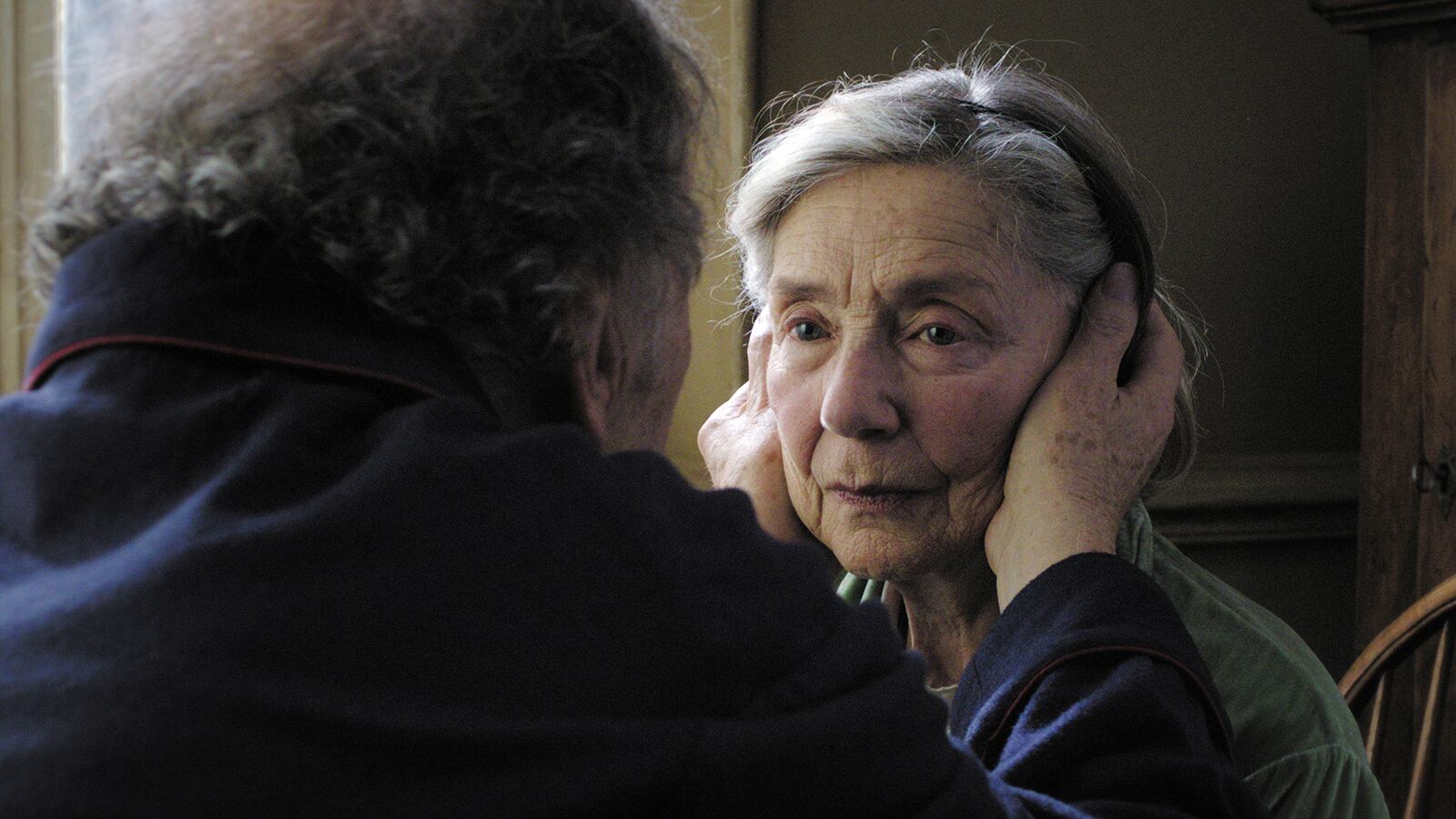She’s a sleeper star on a breathtaking hot streak. And on February 24, Emmanuelle Riva, Oscar’s oldest Best Actress nominee ever, will celebrate her 86th birthday on the red carpet in Hollywood. Yet another dance with serendipity—and, perhaps, a handsome gold statuette—for the French actress, who has collected a mantelpiece worth of hardware for her masterful turn in Austrian director Michael Haneke’s staggering Amour.

The French-language end-of-life drama stars Riva and fellow French screen legend Jean-Louis Trintignant as Anne and Georges, retired Parisian music teachers in their 80s struggling with Anne’s sudden spiral into paralysis and dementia. It is the story of love at its zenith, without glamour; pure, intimate, spare, sans melodrama. The couple’s daughter, Eva (Isabelle Huppert), a musician in London, provides stark contrast, effusively anguished on her whirlwind visits. When Eva sheds the film’s only tears, they seem an indulgence, out of step. “Your concern serves no purpose to me,” Georges, caregiver for her mother, tells Eva. The film has been called Haneke’s warmest and most humane. Although, for the man who brought us The Piano Teacher, Funny Games, and The White Ribbon, that alone doesn’t say much.
“The title is Amour [Love]. It is nothing else. And it’s true that that is an extremely appropriate title,” Riva tells The Daily Beast, speaking in French from her home in Paris.
A cinema, stage, and television actress, published poet, and photographer, Riva has featured in more than 50 films in a career that spans 55 years. But Amour is surely her most internationally celebrated performance since her haunting role in the seminal Nouvelle Vague classic Hiroshima Mon Amour (1959), her second film, a moody tale of forbidden romances, between a French woman and her Japanese lover, her younger self and a German soldier.
“[Amour] is one of the most beautiful roles of my life. It isn’t the only one because I had many very, very beautiful ones, starting with Hiroshima, which was the story of an impossible love,” she muses. “And here, it is a possible love, a love that accomplishes itself entirely.”
Suddenly spoiled for laurels, 20 years after she last held first billing on a cinema marquee, Riva seems no less taken aback than anyone else. “It’s marvelous to have received a gift like this at my age. The gift of such an exceptional script, such an exceptional director,” she says. “That doesn’t exist. It almost doesn’t exist. Have you ever seen that? It’s very rare.”
Haneke has said he wrote the husband’s role for Trintignant and wouldn’t have made the film without him. One of the director’s all-time favorite actors alongside Marlon Brando, Trintignant is exceptional as Georges. But Riva had to audition. “I found the writing extraordinary, truly; the treatment of dialogue wonderful; the roles of both the husband and wife sublime. The story is extraordinary. It touches us all, for sure,” she says. “So right away I thought, ‘Oh! It’s extraordinary!’ Right away I felt—intimately, very intimately—that I could do it. And it was the exact moment of my life where I could do it.”
Last Sunday the actress won a BAFTA, at the British film awards, one omen that an Oscar upset may be looming for the octogenarian who doesn’t do interviews in English and largely sat out the usual frenetic prenomination campaigning. Austria’s official Oscar entry for Best Foreign Film consideration, and last year’s Palme d'Or at Cannes, Amour became the first dual nominee for Best Picture and Best Foreign Film since Ang Lee’s Crouching Tiger, Hidden Dragon in 2000. Haneke is also up for Best Director and Original Screenplay. “Playing in just three U.S. theaters at the time of the Oscar nods, [Amour] had the lowest domestic gross of any movie in modern history nominated for Best Picture: just $368,000,” the Los Angeles Times pointed out in January, underlining the surprise.
Ironically, pundits’ reaction in France to Riva’s Oscar coup on nomination day last month seemed muted at first. Many had instead erred on a repeat Best Actress nomination for Marion Cotillard (Rust and Bone), who in 2007 became only the third French actress to take home an Academy Award, for La Vie en Rose. And although Amour was shot north of Paris, in French, with majority French financing and French screen icons, there was disappointment that France’s official foreign-film entry The Intouchables got snubbed. That upstairs-downstairs buddy comedy, starring Omar Sy in a breakout role, was the third-biggest draw ever at the French box office and has grossed $425 million worldwide. (Sy’s performance won France’s top acting prize last year, beating out The Artist’s Jean Dujardin, Oscar’s 2012 Gallic surprise.)
Not to say Riva, the veteran screen star, is on tenterhooks. Au contraire.

“All around me, all around us, we don’t have to be excited because everyone else is. So I stay very calm,” she says. “It’s very nice to be calmly happy. At my age, I’m not going to sing and dance in the street, even because the film is good,” she says. “That won’t stop me from dancing all by myself, but for other reasons. For my personal joy.” So she isn’t practicing her acceptance speech in the shower? “No, no, that’s not me.”
“I don’t wait, I live. I live my personal life, calmly, and that’s it. We’ll see. What would [winning] change? I don’t think about prizes because it rots people to think only of prizes. It rots an individual,” Riva declares. “People think we’re empty, that we’re fanatical about having prizes,” she says, using “we” as she often does, to represent actors, all actors everywhere. “But I never did that, never.”
For all the apparent weight of the role, Riva insists it wasn’t more difficult than any other. Her character, Anne, spends most of the 127-minute running time in inexorable decline. Elegant and playful before a stroke at the breakfast table just minutes into the film changes everything, the prideful patient slowly yields to grim despondency. “Because it is a lady who becomes very sick, people believe it is difficult [to play]. But no, no. We incarnate a role and voilà,” she says. “I knew people stricken like this. I knew, I saw; there are many. And performing that seemed fascinating. I lived two months of wild happiness, believe it or not. Wild happiness.”
“Sure, it wasn’t easy. But there is a rigor, there is a conductor in Haneke, a conductor who knows the right note to strike in things,” Riva explains, saying the Austrian filmmaker gave her the key in a single resonant directive. “He told me, ‘No sentimentality.’ So I understood right away. No sentimentality. So that becomes really very interesting to perform. Because there is a restraint, a distance that is a pleasure to experience.”
And as Riva tells it, Haneke’s reputation for being severe with his actors, or just plain austere, needs tweaking. “It wasn’t sad, huh?” she says of the film shoot. “It was very rigorous, but filming must be very rigorous. It’s serious. I’m someone who is very cheerful. Haneke is very jovial. But you don’t waste a second and you work seriously.”
In fact, the most difficult part of the wild success of Amour lies elsewhere. Promotion has evidently been overwhelming for an actress in her ninth decade. “It is a lot harder than a film shoot. A lot harder,” she concedes. Indeed, Riva’s last major film-awards experience dates back to the 1960s. And until the week she spent in New York last month for Amour, she hadn’t promoted a film in the city since Georges Franju's Thérèse Desqueyroux (1962), when a North American promotional tour took her to stops as varied as San Francisco, Seattle, and Montreal. “I haven’t had any personal life in a long time. The promotion is completely eating me up,” Riva confides. “They refuse more than a third of what is asked of me, happily. I couldn’t. I'm already on my knees anyway. It’s harassment at this point.”
Riva has skipped some ceremonies, like the BAFTAs on Sunday at London’s Royal Opera House. But she has pledged to attend the Academy Awards. (“We’re obliged to go. We’re nominated, my dear.”) But the awards calendar is unforgiving. Amour is nominated for 10 Césars, France’s top cinema awards, including a nod for Riva, just two nights before the Oscars. Count a 12-hour Paris-Los Angeles flight in between and nine hours’ worth of jet lag. “I don’t know how I’ll manage to wake up. I’ll have to set 10 alarm clocks,” she says. “No, I’m very afraid. Plus, I don’t like planes anymore. Twelve hours flying, do you realize?” she says. “All of this is killing me, I won’t hide it from you. But I’ll do it to the end, God willing.”
Still, Riva is eager to get back to the work she loves. She may be 51 days older than Pope Benedict XVI, who effectively announced his retirement this week. But she bristles intensely at the suggestion—implicit in the reams of coverage pitting her against cinematic neophyte Quvenzhané Wallis, 9, a fellow nominee—that an Oscar win would be a grand finale to a long career, the ultimate finish on a high note. “If I told you you were going to finish your life, you wouldn’t be too happy to hear that,” Riva suggests. “Why should I finish? Must I die before I die?” she asks, ever the poet.
Indeed, far from retiring, Riva’s next act is a part in French director Brigitte Roüan’s quirky holiday comedy Tu Honoreras Ta Mère et Ta Mère. Shot on location in Greece after Amour, it opened in French theaters last week. “There are proposals for roles, stage and cinema,” she reveals. “But I don’t have a lot of time to worry about them. We’ll take a look at that in the spring, when we’ve recovered a bit from our fatigue.” Another 86th birthday present Emmanuelle Riva could cherish.






